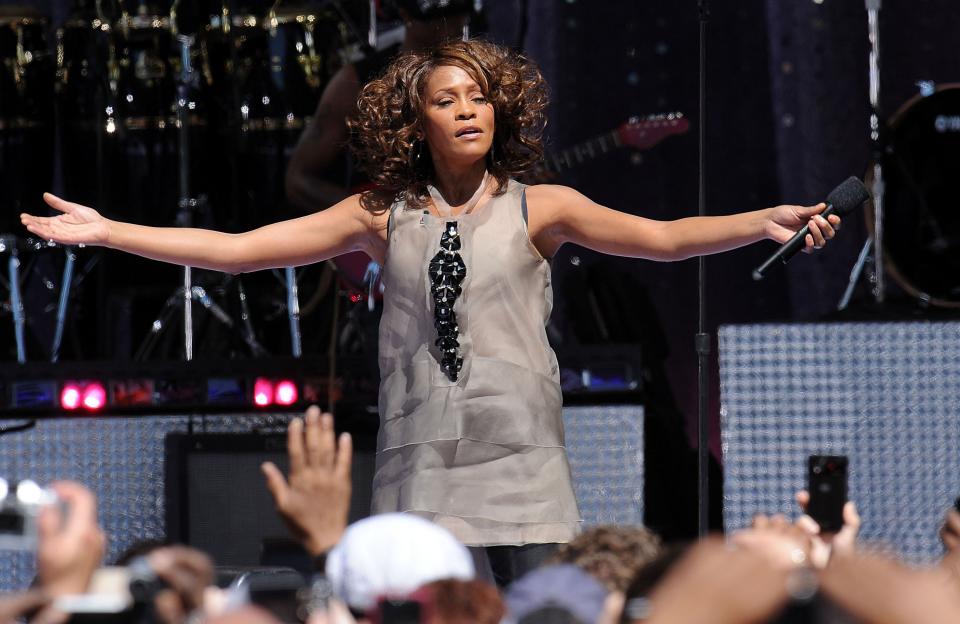'Whitney' director discusses how he discovered the secret of Whitney Houston's childhood abuse
When filmmaker Kevin Macdonald agreed to make Whitney, the first authorized documentary about Whitney Houston, he had one major request for the late singer’s family. “The issue for me was very simple: They had to be willing to give me final cut,” the director tells Yahoo Entertainment. “Making these kinds of films — celebrity portraits — unless you as the filmmaker have control, it’s a slippery slope to hell.” Striking that deal with the Houston family meant that Macdonald had final say over what went in the film, even if the information he turned up didn’t present them, or Houston herself, in the best light.
Of course, that also meant that her family members were on their guard when they first sat down to be interviewed. “All the family were pretty reluctant to talk,” Macdonald remembers. “In principal, they had agreed to be part of this film, but it’s a different matter when they turned up to be on camera.”
Over the course of multiple interviews, though, the director could feel those barriers start to come down and reveal a glimpse of the Whitney Houston who existed outside of the public spotlight, including her pre-fame romantic life and how she revolutionized the national anthem. But as he edited the film, he still felt as though some key piece of information was being kept from him. “I became more and more aware that there was something odd about Whitney’s body language,” he explains. “It made me think that she must have suffered some kind of trauma.” An interview with her brother, Gary Houston, provided a significant clue to back up that hypothesis. While discussing his lifelong struggle with drug addiction, Gary revealed that he was plagued by childhood memories of being sexually abused by a female family member. “I asked if the same thing happened to Whitney, and he said he didn’t know,” Macdonald says. “Just after that, I interviewed his wife, Pat Houston, and she confirmed that Whitney had told her the same thing happened to her.”
That bombshell detail was also confirmed by the singer’s longtime assistant, Mary Jones — who, along with Whitney’s brother, identifies the abuser as Dee Dee Warwick, first cousin to Gary and Whitney and a celebrated singer in her own right. Warwick died in 2008, four years before Whitney Houston, and this story stayed within the family during both their lifetimes. (Whitney’s mother, Cissy Houston, has just issued her first public statement about the allegations in a new People magazine story.)
“[Mary] was of the belief that this was the kind of elephant in the room — this was the thing that had caused so many of Whitney’s problems,” Macdonald says. “She wanted this to come out.” Asked whether he was concerned about any blowback that might accompany identifying Warwick as Whitney’s abuser, the director notes that his concerns were ethical rather than legal. “There were no legal repercussions, because the person we accuse is no longer alive; there were ethical considerations whether or not to use her name, and we did discuss for several weeks — myself and the producers — whether or not it was the right thing to do.”

Ultimately, real life intervened and made Macdonald’s choice for him. The final days of editing Whitney coincided with the fall of Harvey Weinstein and the rise of the #MeToo movement, which shone a harsh light on sexual harassment and abuse in the entertainment industry. “It seemed like the times themselves were telling us, ‘You have to be honest about this … the accuser needs to be believed,'” Macdonald says. “Mary Jones herself [felt] that the victim deserves that, and that maybe by naming Dee Dee, other people will feel that gives them the excuse to name who their own accusers are.”
Having seen Whitney with several different audiences, Macdonald has experienced firsthand how the film has encouraged people to speak up about the abuse they may have experienced in their own lives. “It’s somehow affirming, and makes you realize that you can talk about these things.” That list includes Whitney’s previously tight-lipped family, many of whom now see the value in telling their story — even the parts they previously kept hidden. “I saw Gary Houston the other night, and he said to me that he’s so pleased he did this film; that it was painful but it’s something he should have done years ago. There’s a quote he gives in the film that I think sums it all up: ‘We were a family with a lot of secrets, and when you don’t talk about your secrets, they never ever go away.'”
Whitney is playing in theaters now.
Read more from Yahoo Entertainment:

